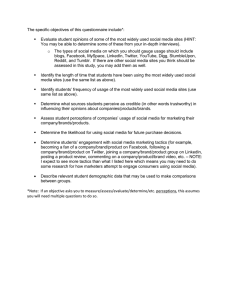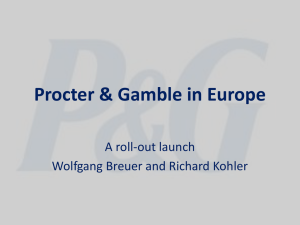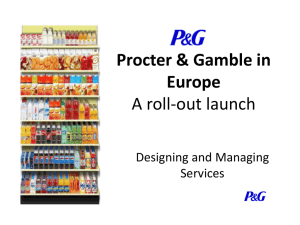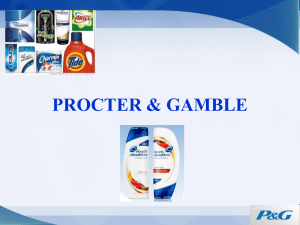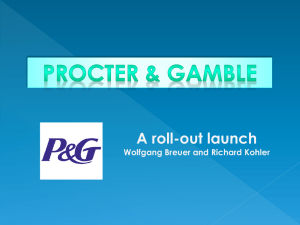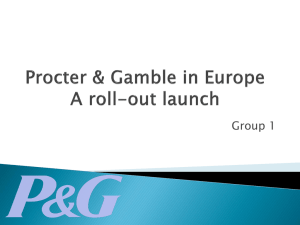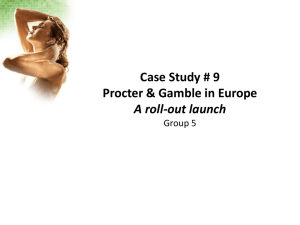Document 15810771
advertisement
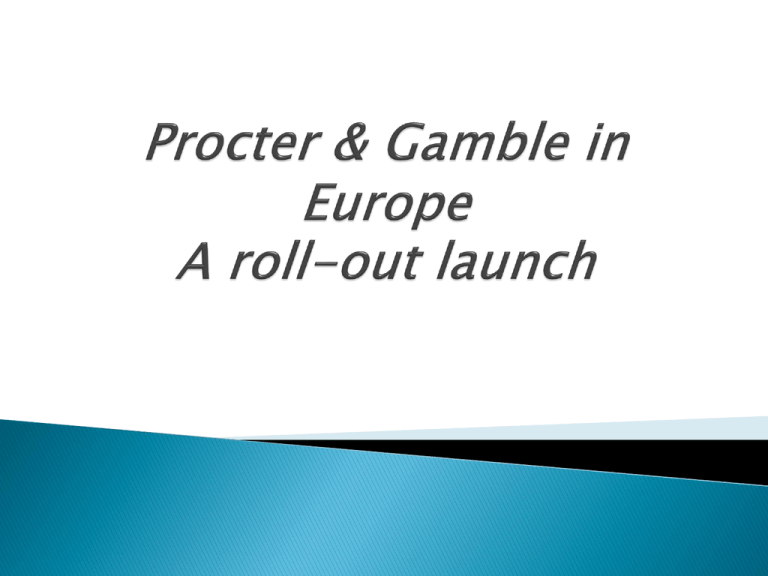
ANDY MARTIN MARY RINKA NAN CATHY Procter and Gamble Company (P&G) was founded by William Procter and James Gamble, in April 1837 to manufacture soap and candles in the U.S With the increase of production demands, the company began to investigate more productive and less time-consuming ways to make soap. That eventually led the firm to many more innovative ideas and many more lines of soap, for hair, laundry, and eventually dish washers. Other kinds of products would be born as well P&G brands are inspired to understand the needs, desires and aspirations of men and women and by their commitment to R&D and collaborative external research By 1978, Procter and Gamble seemed to have covered all bases in household product. From "Tide" laundry detergent to feminine products, P&G dominated the industry with company expansions throughout Japan, China, Europe, and other parts of the world In 1986, The company developed a new technology That enabled consumers to wash and condition their hair using only one product. Pert Plus/Rejoice shampoo quickly became one of the leading worldwide shampoo brands. In1987, P&G celebrated its 150th anniversary. The company ranked as the second-oldest company among the 50 largest Fortune 500 companies. In 1988, The market of the shampoo and conditioner in Europe was growing; there was an evidence of increase hair washing In fiscal year 2007, it had annual revenue of US $ 68.2 billion, and ranked 74th on Fortune 500 list of the world's largest corporations P&G has operations in more than 80 countries, with more than 300 brands on market in 160 countries. These include beauty care, household care and Gillette products. Three billion times a day, P&G brands touch the lives of people around the world Today it is a $83,503 milion personal care and health and wellness company manufacturing a broad range of products anh employing 140,000 people all over the world Personal and beauty: Antiperspirants/Deodorants, Colognes, Cosmetics, Feminine protection, Hair care, Hair color, Personal cleansing, fragrances, skin care House and home: Batteries, Dish care, Household cleaners, Laundry, snacks and beverages, special fabric care Health and wellness: Health care, Oral care, Prescription drugs Baby and family: Baby care, Paper products Introduction of the BC-18 technology in U -Long-term marketing goal of Pert Plus through - Set the clearing objective to achieve as follow - Targeting : all people - Positioning : offer attractive hair in a convenient way - Source of business : New user - Pricing : within premium-price with a price premium up to 100% of the low-price market leader High Quality product concept In the 1st • Strong TV advertising, 12 months • Listing fund $4 million In the Following 12 Months Result • Sample distribution 60% of household • 10 Normal TV advertising • Sample distribution 10% of households • Display activities in hypermarket • In 1987 Vol share 4 % and value share 6.0 %. • In 1988 Vol share 4.5 % and value share 6.3 %. Analyze for their facing problems National brand firmly established in domestic market. How to make European recognize their brand. Gap between price classes market Target group: All people ◦ ◦ ◦ ◦ ◦ esp. West Germany Great Britain France Scandinavia Benelux Price : premium price segment Positioning : offer attractive hair in a convenient way Source of business : New user What are the main issues to be considered in balancing a pan-European introduction strategy with local market needs? ◦ For example, what are the possible alternative brand name strategies? Should the BC-18 technology be introduced with a pan-European name, or with local brand names, or even with a mixture of both approaches? Should a new brand be created, or should an existing brand be relaunched in a new quality? What are possible criteria for that decision? Proctor and Gamble has established a name in the European Market. But statistics shows that its market share is still small as compared to European Brands. With the P&G development of a new haircare technology it would be a lot better to launch it in a new brand name so as to avoid it from being associated with other P&G products. Being the first product offering the new technology in a new brand name would surely catch the attention of the Europeans. What is the longer-term marketing objective? To be able to improve the image of company and its products, and to increase market share in Europe being nearly equal to the competing European companies though the success of Pert Plus. What are the alternative possibilities in relation to issues of positioning, target groups, sources of business, pricing strategy and packaging? Positioning: To position the product as unique - the only one Target Group: All people especially European consumerists Source of business: All people Pricing: Pert Price Plus will cost 40% higher than than the low that could give the maximum cleaning and moisturizing effect of a shampoo and conditioner respectively in one bottle. price market leader – Suave during the first year after launching. Eventually, it would increase its price by 60 % for the next year, with a 30% increase every after 6 months. Answer: 1st year marketing objectives in EU market Increase market share in: High share of conditioner market: West Germany, Great Britain, Scandinavia & Benelux Underdeveloped conditioner market: France (sale volume: 10% of shampoo consumption) & Southern European countries Long-term marketing objectives in EU market Take over the European market Increase brand identity of P&G because the valuebased market share of a shampoo brand is very important Add more brands with BC18 Technology Understand well the EU market & competitors 1ST YEAR MARKETING OBJECTIVES • Specific long term • Use for 1 year • Use to evaluate long term • Evaluate: after 1 year LONG TERM MARKETING OBJECTVES • • • • Drive for 1st year Use for a long period Hard to set up Evaluate: long time Would you undertake a “roll-out” launch, and if so in what country order? What are the decision criteria for this order? In answering this question you should take into account the expected sales volumes as well as the given capacity restrictions. We would first go to Great Britain because out of 5 biggest competitor brand, only 2 are there and their market share is only 13%. After that France because 3 of the company’s shampoos are already there and competition is not big Next would be West Germany due to the biggest market Benelux would be next because marketing is the cheapest, but the competition is highest The last place would take Scandinavia because the market is not too big and because TV and radio advertising are not possible for legal reasons Taking the country with the highest priority, which principles would you use in order to budget media spending? Set out a rough media plan for the first twelve months, with proposals for promotion activities in the first year. How should media and promotion activities be budgeted for the following years? For the first 6 months advertising would be strong, everything would be in use – TV, radio, print, sample distribution in markets and door-to-door… For the next 6 months there would be less advertising but it would still be present everywhere For the following years, media and promotion activities should be less present or if the results are bad, they should still be on the same level Examine the cost and revenue implications of the Europe-wide introduction programme. Is there any loss to be expected in the first years? Does this require a modification of the order of local market entries? Loss is expected in the first few years but it is nothing P&G can’t take because they are a big company We wouldn’t change order of entries in any case except Vidal Sassoon in West Germany
